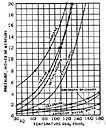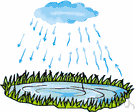vapor
Also found in: Thesaurus, Medical, Acronyms, Idioms, Encyclopedia, Wikipedia.
va·por
(vā′pər)n.
1. The gaseous state of a substance that is liquid or solid at room temperature.
2. A faintly visible suspension of fine particles of matter in the air, as mist, fumes, or smoke.
3. A mixture of fine droplets of a substance and air, as the fuel mixture of an internal-combustion engine.
4. Archaic
a. Something insubstantial, worthless, or fleeting.
b. A fantastic or foolish idea.
5. vapors Archaic
a. Exhalations within a bodily organ, especially the stomach, supposed to affect the mental or physical condition. Used with the.
b. A nervous disorder such as depression or hysteria. Used with the.
v. va·pored, va·por·ing, va·pors
v.tr.
1. To fill or cover with vapor: Perfume vapored the room.
2. To vaporize: "You wished you'd seen one of the monster shots that vapored an atoll way back when" (Don DeLillo).
v.intr.
1. To give off vapor.
2. To evaporate: The fog vapored away.
3. To engage in idle, boastful talk: vapored on about his accomplishments.
[Middle English vapour, from Anglo-Norman, from Latin vapor.]
va′por·er n.
American Heritage® Dictionary of the English Language, Fifth Edition. Copyright © 2016 by Houghton Mifflin Harcourt Publishing Company. Published by Houghton Mifflin Harcourt Publishing Company. All rights reserved.
vapor
(ˈveɪpə)n
(General Physics) the US spelling of vapour
Collins English Dictionary – Complete and Unabridged, 12th Edition 2014 © HarperCollins Publishers 1991, 1994, 1998, 2000, 2003, 2006, 2007, 2009, 2011, 2014
va•por
(ˈveɪ pər)n.
1. a visible exhalation, as fog or smoke, suspended in the air.
2. a substance in gaseous form that is below its critical temperature.
3. a substance converted into vapor for technical or medicinal uses.
4. a combination of a vaporized substance and air.
5. gaseous particles of drugs that can be inhaled as a therapeutic agent.
6. Archaic.
a. a strange, senseless, or fantastic notion.
b. something insubstantial.
7. vapors, Archaic.
v.i. a. mental depression or hypochondria.
b. injurious exhalations supposed to be produced within the body, esp. in the stomach.
8. to rise in the form of vapor.
9. to emit vapor.
10. to talk pompously.
Also, esp. Brit., vapour. [1325–75; < Latin vapor steam]
va′por•a•ble, adj.
va`por•a•bil′i•ty, n.
va′por•er, n.
va′por•less, adj.
va′por•y, adj.
Random House Kernerman Webster's College Dictionary, © 2010 K Dictionaries Ltd. Copyright 2005, 1997, 1991 by Random House, Inc. All rights reserved.
va·por
(vā′pər)1. The gaseous state of a substance that is liquid at room temperature. Because the carbon dioxide gas associated with dry ice is often referred to as a vapor, some scientists classify the gaseous state of substances that are solids at room temperature as vapors as well.
2. A faintly visible suspension of fine particles of matter in the air, as mist, fumes, or smoke.
3. A mixture of fine droplets of a substance and air, as the fuel mixture of an internal-combustion engine.
vaporize verb
Usage When we use the words vapor and steam, we usually think of a fine mist or other visible suspension of particles in the air. We speak of the steam that clouds the bathroom after we take a shower or the vapor in the jet of water droplets that appears a short distance from the end of a boiling tea kettle. But to a scientist, this kind of talk is inaccurate. The word vapor refers to a gaseous state of a substance, and not to a mist of liquid droplets or fine solid particles. For instance, the fumes that arise when volatile substances such as alcohol and gasoline evaporate are (not surprisingly) a vapor. Similarly, the visible stream of water droplets that rush out of the spout of tea kettle is not steam. As the gaseous state of water heated past its boiling point, steam is invisible. Usually, there is a clear space of an inch or two between the spout and the beginning of the visible stream of droplets. This space contains steam. The steam loses its heat to the surrounding air, then falls below the boiling point and condenses in the air as water droplets. It is not, scientifically speaking, water vapor.
The American Heritage® Student Science Dictionary, Second Edition. Copyright © 2014 by Houghton Mifflin Harcourt Publishing Company. Published by Houghton Mifflin Harcourt Publishing Company. All rights reserved.
vapor
- atmosphere - Derives from Greek atmos, "vapor," and sphaira, "globe," and is literally "ball of vapor."
- brume, brumous - Brume is a poetic term meaning "mist, fog, or vapor"; brumous means "foggy."
- damp - The noun first meant "vapor, steam," or "smoke"—especially that which was harmful or noxious.
- transpire - Had an early sense of "emit as vapor through the surface"—from trans-, "through," and spirare, "breathe."
Farlex Trivia Dictionary. © 2012 Farlex, Inc. All rights reserved.
vapor
Past participle: vapored
Gerund: vaporing
| Imperative |
|---|
| vapor |
| vapor |
Collins English Verb Tables © HarperCollins Publishers 2011
vapor
1. Gas which is below the temperature at which it can be liquefied by pressure (the critical temperature).
2. A gas that becomes a liquid under increased pressure.
Dictionary of Unfamiliar Words by Diagram Group Copyright © 2008 by Diagram Visual Information Limited
ThesaurusAntonymsRelated WordsSynonymsLegend:
Switch to new thesaurus
| Noun | 1. |  vapor - a visible suspension in the air of particles of some substance vapor - a visible suspension in the air of particles of some substancesuspension - a mixture in which fine particles are suspended in a fluid where they are supported by buoyancy steam - water at boiling temperature diffused in the atmosphere water vapor, water vapour - water in a vaporous form diffused in the atmosphere but below boiling temperature |
| 2. |  vapor - the process of becoming a vapor vapor - the process of becoming a vapor boiling - the application of heat to change something from a liquid to a gas clouding, clouding up - the process whereby water particles become visible in the sky phase change, phase transition, physical change, state change - a change from one state (solid or liquid or gas) to another without a change in chemical composition |
Based on WordNet 3.0, Farlex clipart collection. © 2003-2012 Princeton University, Farlex Inc.